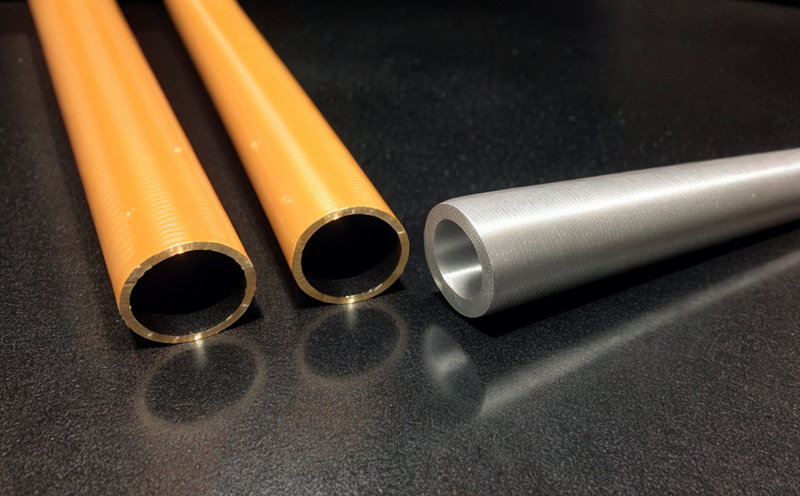EN 2854 Compression Testing of Composites at High Temperature Validation Method Development Test
The EN 2854 standard provides a validated method to perform compression testing on composite materials under high-temperature conditions. This service is critical for aerospace and aviation industries, where the performance and integrity of materials are paramount in ensuring safety and reliability.
Developing a robust validation method involves several intricate steps. The first step is selecting the appropriate specimen dimensions and geometry that accurately represent real-world applications. Specimens must be precisely manufactured to ensure consistency across multiple tests. The chosen material type plays a crucial role, as different composites have varying thermal expansion coefficients and mechanical properties.
The testing environment also requires careful consideration. High-temperature compression tests demand controlled temperature chambers capable of maintaining precise setpoints within narrow tolerances. These environments should be equipped with sensors for real-time monitoring to ensure accurate data collection. The choice of test equipment is equally important; high-quality hydraulic presses are essential for generating the necessary compressive loads while maintaining stability.
Once the specimens and testing apparatus are prepared, the actual compression testing commences. This involves applying controlled heating to the specimen until it reaches a specified temperature, followed by loading it under compression. The load cell measures force applied during the test, which is then correlated with displacement data collected from linear variable differential transformers (LVDTs) or strain gauges.
The success of this testing method hinges on precise control over environmental parameters such as temperature and humidity. These factors can significantly influence the mechanical properties of composite materials. Therefore, maintaining a stable and predictable test environment is crucial for obtaining reliable results.
Post-test analysis involves examining both macroscopic and microscopic aspects of the specimens. Visual inspections look for surface defects or changes in coloration indicative of thermal degradation. Microscopy techniques such as scanning electron microscopy (SEM) provide detailed insights into internal microstructures, revealing any signs of delamination or cracking under high temperatures.
The data collected from these tests is analyzed according to EN 2854 guidelines to determine compliance with specified limits. Compliance ensures that the material meets stringent industry requirements, thereby enhancing overall product quality and safety.
This rigorous testing process not only verifies the performance of composite materials but also helps in identifying potential weaknesses or areas for improvement. By continuously refining validation methods through thorough testing protocols, manufacturers can ensure they are producing reliable products that meet international standards like EN 2854.
- Customer Impact and Satisfaction: Ensuring compliance with EN 2854 helps clients avoid costly recalls and product failures. Reliable materials lead to safer aircraft components, enhancing overall customer satisfaction.
Scope and Methodology
The scope of this service includes developing a validated method for compression testing of composite materials under high-temperature conditions as per EN 2854. This involves several key steps:
- Selecting appropriate specimen dimensions and geometry.
- Precisely manufacturing specimens to ensure consistency.
- Choosing the right material type based on thermal properties.
- Carefully selecting high-quality test equipment for accurate measurements.
The methodology follows strict protocols outlined in EN 2854, ensuring accuracy and reliability. It encompasses controlled heating of specimens followed by application of compressive loads while monitoring temperature changes continuously. Post-test analysis includes visual inspections and microscopic examinations to assess material integrity thoroughly.
By adhering strictly to these procedures, we guarantee that the results obtained are reliable and can be trusted for making informed decisions about product development and quality assurance.
Eurolab Advantages
Our team at Eurolab brings extensive experience in aerospace and aviation testing, leveraging this expertise to deliver top-tier services. Our state-of-the-art facilities offer the ideal environment for conducting high-temperature compression tests on composite materials accurately.
- Expertise: Our experienced professionals have deep knowledge of EN 2854 standards.
- Precision Equipment: We utilize cutting-edge test equipment designed specifically for high-precision measurements.
- Consistency: Our processes ensure consistent results across all tests conducted in our labs.
- Comprehensive Reporting: Detailed reports are provided, including raw data and analysis.
These advantages make us the preferred choice for quality managers, compliance officers, R&D engineers, and procurement personnel seeking reliable testing solutions. By partnering with Eurolab, clients gain access to unparalleled resources and expertise in materials and composite testing.





